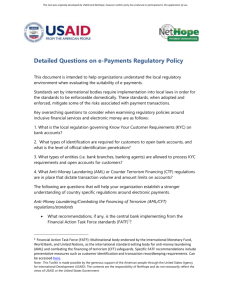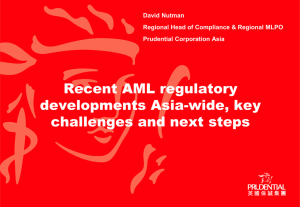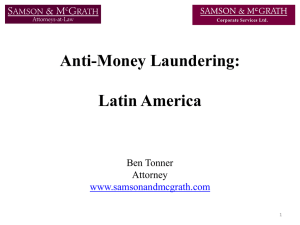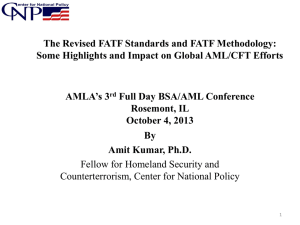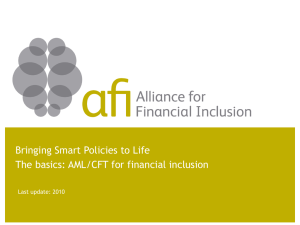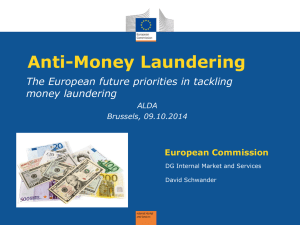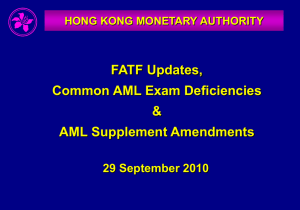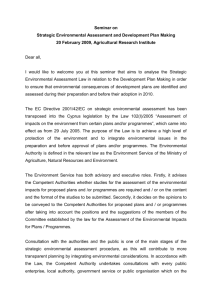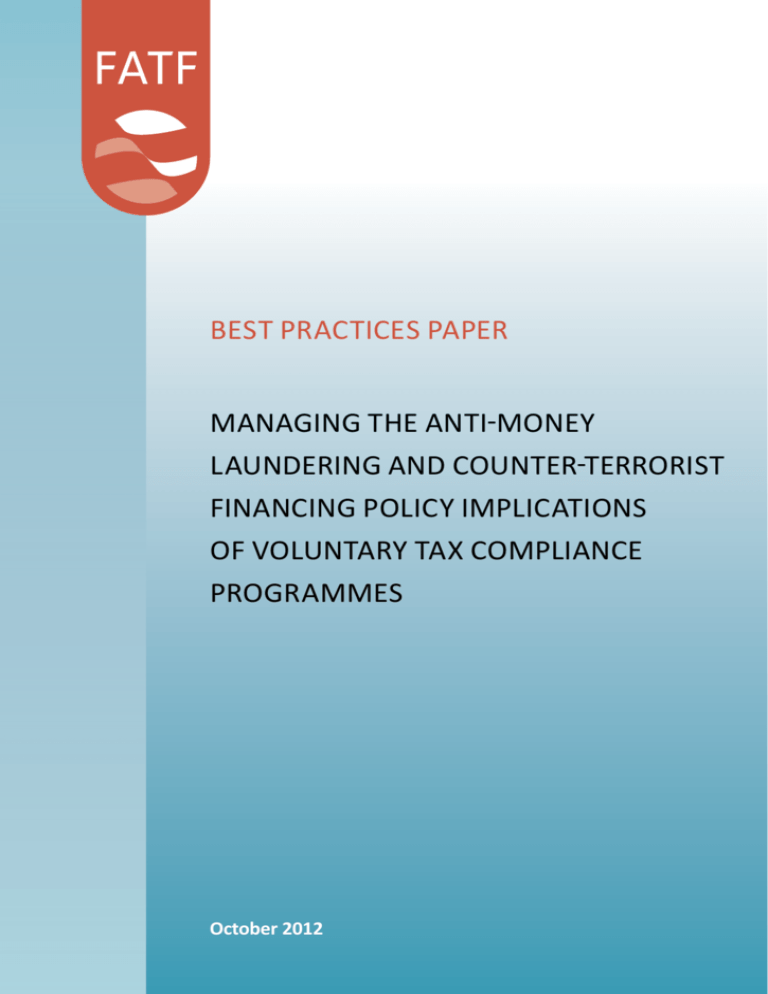
Best Practices Paper
MANAGING THE ANTI-MONEY
LAUNDERING AND COUNTER-TERRORIST
FINANCING POLICY IMPLICATIONS
OF VOLUNTARY TAX COMPLIANCE
PROGRAMMES
October 2012
FINANCIAL ACTION TASK FORCE
The Financial Action Task Force (FATF) is an independent inter-governmental body that develops and
promotes policies to protect the global financial system against money laundering, terrorist financing
and the financing of proliferation of weapons of mass destruction. The FATF Recommendations are
recognised as the global anti-money laundering (AML) and counter-terrorist financing (CFT) standard.
For more information about the FATF, please visit the website:
www.fatf-gafi.org
© 2012 FATF/OECD. All rights reserved.
No reproduction or translation of this publication may be made without prior written permission.
Applications for such permission, for all or part of this publication, should be made to
the FATF Secretariat, 2 rue André Pascal 75775 Paris Cedex 16, France
(fax: +33 1 44 30 61 37 or e-mail: contact@fatf-gafi.org).
BEST PRACTICES
MANAGING THE ANTI-MONEY LAUNDERING AND COUNTER-TERRORIST FINANCING POLICY IMPLICATIONS OF VOLUNTARY
TAX COMPLIANCE PROGRAMMES
BEST PRACTICES
MANAGING THE ANTI-MONEY LAUNDERING AND
COUNTER-TERRORIST FINANCING POLICY IMPLICATIONS
OF VOLUNTARY TAX COMPLIANCE PROGRAMMES
I.
INTRODUCTION
1.
Voluntary tax compliance (VTC) programme refers to any programme that is designed to
facilitate legalisation of the taxpayer’s situation vis-à-vis funds or other assets that were previously
unreported or incorrectly reported. Countries1 may introduce VTC programmes for a variety of
purposes including: raising tax revenue; increasing tax honesty and compliance; and/or facilitating
asset repatriation for the purpose of economic policies, especially when the country is in an
economic crisis. Such programmes come in a variety of forms and may involve voluntary disclosure
mechanisms, tax amnesty incentives and/or asset repatriation. In many cases, VTC programmes are
introduced by a highly political decision reacting to the immediate economic or fiscal situation of
the country. In such circumstances, the programme may be introduced on short notice (e.g. in
response to a serious financial crisis).
2.
The Financial Action Task Force (FATF) recognises the potential for VTC programmes to be
abused by criminals for the purpose of moving funds. The level of potential money laundering (ML)
and terrorist financing (FT) risk varies greatly, depending on the characteristics of the particular
VTC programme being implemented. In general, a programme that is being used solely for the
purpose of allowing taxpayers to voluntarily correct tax reporting information would not seem to
carry a significant ML/FT risk. However, the ML/FT risk is greater when the programme fully or
partially incorporates elements of tax amnesty or asset repatriation.
3.
Tax amnesty incentives and asset repatriation may increase the potential ML/FT risks for the
following reasons. First, both tax amnesty and asset repatriation incentives encourage taxpayers to
bring forward funds or other assets that were previously undeclared. This may result in large
volumes of funds or other assets, which were previously held outside of the formal financial system
or held in another country, being deposited into financial institutions throughout the duration of the
programme. This may result in excessively large volumes of transactions that overwhelm the
capacity of financial institutions to apply anti-money laundering (AML) and counter-terrorist
financing (CFT) measures effectively, particularly if it is burdensome for financial institutions to
distinguish ordinary transactions from those related to the programme. Second, financial
institutions may believe that the legitimacy of funds or other assets being deposited under such a
programme has been officially endorsed by the authorities. Third, where funds or other assets are
being repatriated, information on the funds or other assets and the taxpayer may be held in
1
All references to country or countries apply equally to territories or jurisdictions.
2012 OECD/FATF
1
BEST PRACTICES
MANAGING THE ANTI-MONEY LAUNDERING AND COUNTER-TERRORIST FINANCING POLICY IMPLICATIONS OF VOLUNTARY TAX
COMPLIANCE PROGRAMMES
different countries, making it more difficult for financial institutions and the authorities to verify the
legitimacy of the funds or other assets.
II.
STATEMENT OF THE PROBLEM
4.
An issue of particular concern which has come to the attention of the FATF is that some VTC
programmes, explicitly or in practice, exempt full or partial application of AML/CFT measures. For
example, some programmes exempt financial institutions from the requirements to conduct full
customer due diligence (CDD) on taxpayers and verify that the funds or other assets being declared
or repatriated come from a legitimate source, or may grant the taxpayer immunity from
investigation or prosecution for money laundering in relation to declared or repatriated funds or
other assets.
5.
To highlight the importance of ensuring that VTC programmes do not negatively impact the
effectiveness of AML/CFT systems, the FATF has agreed four basic principles which underscore the
importance of ensuring that countries address and mitigate the ML/FT risks of VTC programmes,
and are able to effectively investigate and prosecute their abuse.
6.
This paper sets out international best practices, based on the four basic principles, to assist
countries in their implementation of VTC programmes, with a view to ensuring that such
programmes do not impede the effective implementation of AML/CFT measures. It is important to
note that the extent to which the following best practices are relevant will depend on the particular
characteristics of the VTC programme, including whether it involves tax amnesty or asset
repatriation.
III.
7.
2
DEFINITIONS
For the purpose of this paper, the following definitions apply:
(a)
The term asset repatriation refers to bringing (i.e. repatriating) funds or other assets
from abroad to the home country.
(b)
The term tax amnesty refers to favourable tax treatment such as a full or partial
reprieve from any tax, interest and penalties that would otherwise be due in relation to
previously unreported (or incorrectly reported) taxable income, funds or other assets.
(c)
The term voluntary disclosure refers to the voluntary disclosure to the tax authorities
of any previously unreported (or incorrectly reported) taxable income, funds or other
assets.
(d)
The term voluntary tax compliance programme refers to any programme that is
designed to facilitate legalisation of the taxpayer’s situation vis-à-vis funds or other
assets that were previously unreported or incorrectly reported.
2012 OECD/FATF
BEST PRACTICES
MANAGING THE ANTI-MONEY LAUNDERING AND COUNTER-TERRORIST FINANCING POLICY IMPLICATIONS OF VOLUNTARY
TAX COMPLIANCE PROGRAMMES
IV.
EFFECTIVE APPLICATION OF AML/CFT PREVENTATIVE
MEASURES
Principle 1: The effective application of AML/CFT preventative measures is a prerequisite for
addressing and mitigating the money laundering and terrorist financing risks associated with
implementing any type of voluntary tax compliance programme.
8.
Overall, the effective application of AML/CFT preventative measures is a prerequisite for
mitigating the ML/FT risks associated with implementing any type of VTC programme.
9.
This section describes elements, considered to be best practices, which countries may
incorporate into a VTC programme to ensure that it does not pose an unreasonable ML/FT risk or
seriously undermine the effectiveness of the AML/CFT regime:
(a)
Taxpayers are required to deposit repatriated assets with a financial institution(s) that
is subject to AML/CFT measures.
(b)
The application of the programme takes into account the ML/FT risks of funds or other
assets repatriated from countries that do not adequately apply the FATF
Recommendations.
(c)
The authorities raise awareness among financial institutions on the potential for abuse
and the ML/FT risks inherent in the VTC programme.
(d)
The authorities raise awareness among financial institutions that any documents or
statements issued by the competent authorities in relation to the VTC programme are
not official endorsements that the assets involved are of legitimate origin.
2012 OECD/FATF
3
BEST PRACTICES
MANAGING THE ANTI-MONEY LAUNDERING AND COUNTER-TERRORIST FINANCING POLICY IMPLICATIONS OF VOLUNTARY TAX
COMPLIANCE PROGRAMMES
V.
PROHIBITION OF EXEMPTING AML/CFT REQUIRMENTS
Principle 2: The FATF Recommendations do not allow for full or partial exemptions from AML/CFT
requirements in the context of implementing a voluntary tax compliance programme. Therefore,
when implementing a voluntary tax compliance programme, national authorities should ensure that
its terms do not allow, in law or in practice, for full or partial exemptions from AML/CFT
requirements as set out in the FATF Recommendations. Voluntary tax compliance programmes
which do so are in breach of the FATF Recommendations.
10.
It is important to note that the FATF Recommendations do not allow for full or partial
exemptions from AML/CFT requirements in the context of implementing a VTC programme.
Programmes purporting to do so are in breach of the FATF standards.2
11.
It is best practice for countries to ensure that any VTC programme being implemented does
not explicitly set out full or partial exemptions from AML/CFT requirements, or result in such
exemptions in practice. This means ensuring that the VTC programme is consistent with the
following AML/CFT requirements, as relevant:
(a)
Financial institutions are required to conduct CDD on taxpayers who are transferring,
repatriating or depositing assets under the programme, as appropriate, based on an
assessment of the applicable risks.
(b)
Financial institutions are required to identify the beneficial owner of the account into
which the assets are being transferred, repatriated or deposited under the programme.
(c)
Financial institutions should, where necessary, take reasonable measures to establish
the origin of the assets being transferred, repatriated or deposited, in accordance with
applicable CDD requirements.
(d)
Financial institutions are prohibited from accepting deposits under the programme by
way of wire transfers that are not accompanied by required originator information and
required beneficiary information, as required by Recommendation 16.
This footnote is intended to clarify the application of the four basic principles since February 2012 when the
FATF made tax crimes (related to direct taxes and indirect taxes) predicate offences for money laundering. A
VTC programme does not breach Principle 2 if the taxpayer is exempted from prosecution for previously not
reporting (or incorrectly reporting) taxable income, funds or other assets, and for money laundering, insofar
as it exclusively relates to the proceeds of this incorrect or non-reporting of taxable income, funds or other
assets, provided that:
2
(i) the funds or other assets are of lawful origin; and
(ii) there are no exemptions from undertaking AML/CFT requirements (including CDD and reasonable
measures, where necessary, to establish the origin of the funds or other assets); and
(iii) in cases where the taxpayer’s funds or other assets originate from other predicate offence(s), the
taxpayer is subject to prosecution for these other predicate offence(s) and related money laundering.
4
2012 OECD/FATF
BEST PRACTICES
MANAGING THE ANTI-MONEY LAUNDERING AND COUNTER-TERRORIST FINANCING POLICY IMPLICATIONS OF VOLUNTARY
TAX COMPLIANCE PROGRAMMES
(e)
The authorities advise financial institutions that AML/CFT measures are applied to the
programme, and financial institutions are not exempted from reporting suspicious
transactions to the financial intelligence unit (FIU), particularly in relation to: (i)
declared/repatriated funds or other assets that are thought to have resulted
exclusively from tax offences which are not punishable under the programme in
accordance with the FATF Recommendations 20 and 21, and (ii) taxpayers who are
reluctant or uncooperative in disclosing information concerning customer
identification or the source of the funds or other assets being repatriated under the
programme. Consideration should be given to require the systematic reporting to the
FIU of all repatriated funds or other assets or by making such information directly
available to the FIU in some other way.
(f)
Taxpayers are not exempt, by law or in practice, from investigation or prosecution for
ML/FT in relation to repatriated funds or other assets (see also footnote 2).
VI.
DOMESTIC CO-ORDINATION AND CO-OPERATION
Principle 3: When implementing a voluntary tax compliance programme, it should be ensured that
all relevant domestic competent authorities be able to co-ordinate and co-operate, and exchange
information, as appropriate, with a view to detecting, investigating and prosecuting any ML/FT
abuse of the programme.
12.
A VTC programme may impact on a number of authorities at the domestic level, including the
tax authorities, the FIU, law enforcement, supervisory authorities, prosecutorial authorities and
customs authorities. Consequently, it is important to ensure that all relevant domestic authorities
are able to co-ordinate and co-operate, as appropriate, with a view to detecting, investigating and
prosecuting any ML/FT abuse of the programme. The following best practices will help meet this
objective:
(a)
Mechanisms are in place to enable the relevant authorities to co-ordinate, co-operate
and share information, as appropriate, in preparation for the programme’s
implementation, throughout its duration, and after its expiration.
(b)
The tax authorities have the authority to conduct their own investigations into the
origin of assets subject to the programme, or refer such investigations to other
appropriate authorities who are authorised to conduct such investigations, in
accordance with the role of the tax authorities and the terms of the VTC programme.
(c)
Mechanisms are in place which enable information related to the programme (e.g. on
taxpayers and/or declared/repatriated funds or other assets) to be shared between
competent authorities that hold such information and the FIU.
(d)
The authorities involved in the programme are adequately resourced to manage their
roles in the programme, in addition to their normal functions.
2012 OECD/FATF
5
BEST PRACTICES
MANAGING THE ANTI-MONEY LAUNDERING AND COUNTER-TERRORIST FINANCING POLICY IMPLICATIONS OF VOLUNTARY TAX
COMPLIANCE PROGRAMMES
VII.
INTERNATIONAL CO-OPERATION
Principle 4: The widest possible range of mutual legal assistance and exchange of information in
ML/FT investigations, prosecutions and related proceedings relating to the abuse of voluntary tax
compliance programmes, including asset recovery investigations and proceedings, should be
provided.
13.
VTC programmes involving asset repatriation, by their nature, impact more than one country.
In some circumstances, this may increase the potential ML/FT risks. The following best practices
ensure that, where more than one country is impacted by a VTC programme, the authorities can
provide the widest possible range of mutual legal assistance and exchange of information to
mitigate these risks and ensure that any related ML/FT activity is effectively investigated and
prosecuted:
6
(a)
The authorities of countries from which funds or other assets are likely to be
repatriated provide the widest degree of co-operation to the authorities implementing
the VTC programme.
(b)
Mechanisms, such as bilateral and multilateral treaties and other international
arrangements, are in place to enable the country implementing the VTC programme to
proactively share information and co-operate with the authorities of countries from
which funds or other assets are being repatriated and other affected countries.
(c)
The repatriation of funds or other assets from countries that do not adequately apply
the FATF Recommendations is subject to enhanced due diligence and scrutiny.
2012 OECD/FATF

